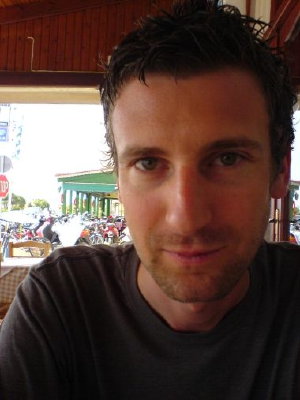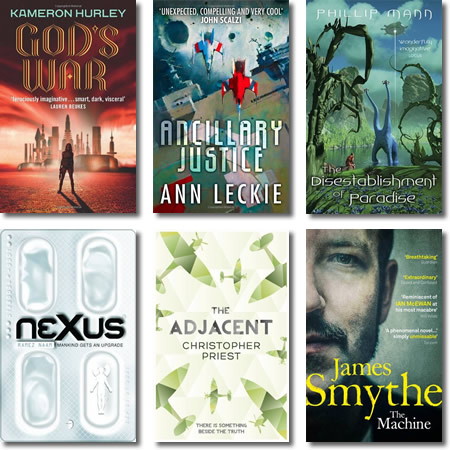With the winner of this year's Arthur C Clarke Award being announced on Thursday 1 May, award director Tom Hunter examines the reaction to this year's shortlist
This is a guest blog by the director of the prestigious Arthur C Clarke Award for science fiction, Tom Hunter...

I'm writing this from the Clarke Award's secret satellite HQ, located in geosynchronous orbit somewhere high above the Earth.
Now in it's 28th year, it's true that some parts of our secret base are beginning to show their age – the death ray hasn't worked in ages, for instance – but inside the central hub the science labs where we breed each new generation of judges are working fine, and the control room itself is a state-of-the-art monitoring station from where I can watch news of the award come in from all over the world.
And this year has been a particularly interesting year to watch precisely because no single major controversy or critical opinion has risen up to dominate the discourse.
This isn't to say we've somehow driven the SF readership into a meek, shortlist-loving compliance this year (this would be impossible to do even if we did have a fully functioning death ray!) but rather that this year's shortlist has pulled off the neat trick of avoiding easy categorization, and thus quick critique.
It is, in short, a jujitsu kind of shortlist, never leading the offensive but always poised, ready to slip an attack and dodge to safety.
Sign up to the SFX Newsletter
Get sneak previews, exclusive competitions and details of special events each month!

Think award nominations are always made up of the same familiar and obvious faces? Well this year half - that's right half - of this year's shortlist is made up of first books by new novelists: Kameron Hurley, Ann Leckie and Ramez Naam.
Oh, so it's a deliberately young bloods kind of list is it, foregoing established writers in search of the new?
Well no, actually, because we also have two career authors on the list, both now in their seventies as it happens, and both highly regarded within the SF community. Christopher Priest has been nominated multiple times before, and won the award for his classic The Separation in 2003. Phillip Mann on the other hand has recently returned to SF writing after a twenty-year hiatus (so, almost as long as we'll have to wait for the end of Game Of Thrones !).
Interestingly Phillip's The Disestablishment Of Paradise is also one of the most overtly Clarkeian books in spirit to be nominated for the award in recent history, with the Clarke Award more typically acting as a touch point for those who argue that much of modern SF typically hangs out on the edges of science fiction in order to gain some kind of literary favour, and that awards should remain more faithful to what we might term “core genre.”
This year's shortlist on the other hand seems to successfully straddle the two poles while not displaying overt favouritism to either.
So, you have books set in space and on alien planets on the same shortlist as near-future climate change settings and intimate character pieces exploring the fragility of human identity; and so the shortlist ducks and weaves again.
On Thursday 1 May we will travel down the space elevator to London's Royal Society and announce our winner in front of an audience of science fiction's finest authors, publishers and fans.
Until then though, the ultimate victor is anyone's guess, but here are a few of my own personal reasons why each book on this year's shortlist would be a well-deserved winner.
God's War by Kameron Hurley: Originally published in the US in 2011, and immediately picking up a British fanbase via hugely positive word of mouth, it's no surprise to see this book shortlisted now it's been published in the UK. According to previous Clarke Award winner Lauren Beukes it's “ferociously inventive… smart, dark and visceral” which frankly is more than enough recommendation for me.
Ancillary Justice by Ann Leckie: It won the Golden Tentacle for best debut at this year's The Kitschies awards, scooped the best novel prize from the British Science Fiction Association (jointly along with Gareth L Powell's excellent Ack Ack Macaque ) and has just been nominated for this year's Hugo Award. In other words picking up prizes in both juried and popular vote awards, so already a book of the year and definitely one to watch.
The Disestablishment Of Paradise by Phillip Mann: Classic science fictional themes of environmentalism, alien landscapes and humanity's place in the universe run deep in Phillip Mann's return to the SF genre. As mentioned above, this is classic Sir Arthur C Clarke territory, and time perhaps for the award that bears his name to deliver a winning book that successfully builds on the long legacy of classic science fiction writers.
Nexus by Ramez Naam: Another first-time author, and another title that is appearing on multiple shortlists this year. Alongside the Clarke Award, Ramez has also been nominated for the Campbell, Prometheus and Kitschie Awards and has also bee named an NPR best book of the year. Wired magazine called Nexus “Scary good” and Alastair Reynolds compared the experience of reading the book to watching the Bourne films, so this could definitely be a winning combination of SF ideas and action.
The Adjacent by Christopher Priest: While three of this year's six shortlisted authors are first-time novelists, this is Priest's fourth time being nominated for the Arthur C Clarke Award, which clearly gives him an advantage. Describing this book moves instantly into spoiler territory, so let's just say that the first time he was nominated for the Clarke Award it was for The Prestige , and surely any writer who can count Christopher Nolan as one of their biggest fans is going to be hard to beat?
The Machine by James Smythe: Frankenstein is arguably the first proper science fiction novel, and Smythe brilliantly updates this source premise with a contemporary tale of fractured identities and the traumatizing effects of war. On the one hand this is the most intimate of the books on this year's shortlist but it is also arguably the one that lingers in the mind the longest. The real question is whose mind is it really haunting, and who first put the memory there?

The winner of this year’s Arthur C Clarke Award will be announced in the evening, this Thursday, 1 May. Follow award director Tom Hunter on Twitter at @ClarkeAward and check back to www.sfx.co.uk to see more at the end of the week.
SFX Magazine is the world's number one sci-fi, fantasy, and horror magazine published by Future PLC. Established in 1995, SFX Magazine prides itself on writing for its fans, welcoming geeks, collectors, and aficionados into its readership for over 25 years. Covering films, TV shows, books, comics, games, merch, and more, SFX Magazine is published every month. If you love it, chances are we do too and you'll find it in SFX.


